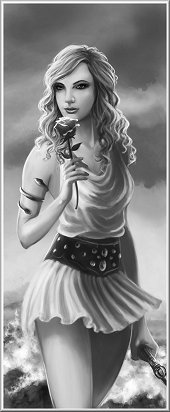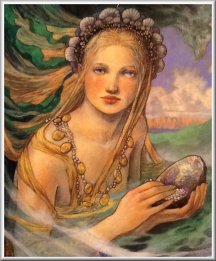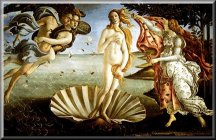
APHRODITE BY ALYANA

CLICK TO
ENLARGE

CLICK TO
ENLARGE

CLICK TO
ENLARGE
|
APHRODITE PAGE ONE
Aphrodite was the ancient Greek goddess of Beauty, Love,
Fertility and Desire. She was one of the Major Olympians and
played a dramatic role throughout ancient history, featuring in
countless myths and stories.
Aphrodite was - and is - quite fascinating, for many reasons!
Her parentage is uncertain. The poet Homer, in the epic poem
called the 'Iliad', claimed that she was the daughter of Zeus
and the Titaness Dione. She may also have been a daughter of
Amphitrite by Triton or perhaps Cronus, father of many
Olympians.
Many versions of her origin exist. But later myths and poems say
that the goddess of Love had risen from the sea foam on a
seashell after Cronus tossed his father Uranus' severed genitals
there. This is the most widely accepted take, but depending on
the source, any of these versions may be considered accurate.
Her name was thus explained as "foam-risen", coming from the
Greek word 'Aphros', which means 'foam'. The actual "sea-birth"
is said to have taken place near the island of Cythera, but
supposedly she first walked ashore on Paphos in Cyprus.
The South Wind claimed to have seen her floating in a scallop
shell off the island of Cythera, and steered her gently ashore.
That's the reason why she was called 'The Cyprian' or'Cytherea' as
often as by her proper name.
The Horae (Hours, Seasons) welcomed her joyously and clothed and
attended to her, hanging golden ornaments in her ears and
adorning her with golden necklaces. They put on her head a crown
of gold and then the Horae brought Aphrodite to Mount Olympus,
to be introduced to the Olympian gods.
HOMERIC
HYMN TO APHRODITE
The breath of the west wind bore her
Over the sounding sea,
Up from the delicate foam,
To wave-ringed Cyprus, her isle.
And the Hours golden-wreathed
Welcomed her joyously.
They clad her in rainment immortal,
And brought her to the gods.
Wonder seized them all as they saw
Violet-crowned Cytherea.
Aphrodite each year would return to Paphos, in Cyprus, and swim
in the sea for good luck and to rejuvenate herself.
Robert Graves, in his book "Greek
Gods and Heroes", tells us that "Aphrodite's throne was
silver, inlaid with beryls and aquamarines, the back shaped like
a scallop shell, the seat made of swan's down, and under her
feet lay a golden mat -- an embroidery of golden bees, apples,
and sparrows."
The poets liked to paint an idealistic picture of Aphrodite,
filled with beauty and happiness - The winds flee before her and
the storm clouds; sweet flowers embroider the earth; the waves
of the sea laugh; she moves in radiant light. Without her there
is no joy nor loveliness anywhere.
However, in the Iliad, the story of the Trojan War which praised
brutal strength and power as heroism, she was shown as a soft
and weak creature, whom even mortals could attack, and even
wound in battle.
Aphrodite wasn't always sweet. When it suited her, she could be
rather malicious and treacherous, and her influence over men was
often deadly. She could turn the heart of any man to longing and
passion, and it was said that when she spoke, even Zeus
listened...after all, the King of the Olympians was notorious
for succumbing to Love's temptations.
The lame god of the forge and metalworking, Hephaestus, was her
husband, although he was the only god to be physically ugly. It
was an arranged marriage - Some say that when Aphrodite first
arrived on Mount Olympus, Zeus was struck by her beauty and
radiance and he was certain that the other gods would fight for
her affections.
So he awarded Aphrodite to the most dependable and steady deity,
Hephaestus. Needless to say, Hephaestus considered himself the
luckiest god on Olympus and he did his utmost to please his
gorgeous bride, continuously creating and designing new golden
jewelry and furniture to please her.
In addition to her irresistible looks Aphrodite had a magical
golden girdle, made by Hephaestus, that when worn compelled
anyone she wished to desire her.
As if she weren't irresistible enough already!
But Aphrodite considered it shameful and a disgrace to be the
wife of such a "blue collar", manual-labor kind of god.
Hephaestus was unattractive, sooty-faced, hard-working, crippled
and not quite the "party animal" that his wife was, and she
insisted on having a bedroom of her own, separate from his. Not
to mention many illicit lovers, as you'll see!
APHRODITE CONTINUES
ON PAGE TWO
LOTS OF COOL STORIES AND GREAT PIX
CLICK HERE!

|







